Winter 2018 Class Schedule
| Course | Title | Instructor | Lecture | Discussion |
|---|---|---|---|---|
| HUM 220-0-20 | Health, Biomedicine, Culture, and Society | Steve Epstein | TuTh 9:30 – 10:50 am | |
HUM 220-0-20 Health, Biomedicine, Culture, and Society
HUM 220-0-20: Health, Biomedicine, Culture, and Society Fulfills Distro 3 (Social and Behavioral Sciences), Distro 5 (Ethics and Values), or Interdisciplinary Distro Present-day medicine and health care are flashpoints for a bewildering array of controversies--about whose interests the health care system should serve and how it should be organized; about the trustworthiness of the medical knowledge we rely on when we are confronted with the threat of illness; about the politics and ethics of biomedical research; about whether health care can be made affordable; about how the benefits of good health can be shared equitably across lines of social class, race, and gender; and about the proper roles of health professionals, scientists, patients, activists, and the state in establishing medical, political, and ethical priorities. By providing a broad introduction to the domain of health and biomedicine, this course will take up such controversies as matters of concern to all. We will analyze the cultural meanings associated with health and illness; the political controversies surrounding health care, medical knowledge production, and medical decision-making; and the structure of the social institutions that comprise the health care industry. We will examine many problems with the current state of health and health care in the United States, and we will also consider potential solutions. | ||||
Bio coming soon | ||||
| HUM 260 | Alternatives: Modeling Choice Across the Disciplines (SLAVIC 396) | Gary Saul Morson and Morton Schapiro | TuTh 12:30 - 1:50 pm | |
HUM 260 Alternatives: Modeling Choice Across the Disciplines (SLAVIC 396)
HUM 260: Alternatives: Modeling Choice Across the Disciplines Fulfills Distro 5 (Ethics and Values), Distro 6 (Literature and Fine Arts), or Interdisciplinary Distro At any given moment, how many alternatives are possible? Is there really such a thing as chance or choice? On what basis do we choose? How does our understanding of the past affect the future? Professor Morson, a specialist in literature, and Professor Schapiro, a labor economist specializing in the economics of higher education, will offer alternative approaches to these questions based on the presuppositions of their respective disciplines. | ||||
Bio coming soon | ||||
| HUM 370-4-20 | Mobilizing Revolution: Dancing Histories of Cuba | Elizabeth Schwall | MW 9:30 - 10:50 am | |
HUM 370-4-20 Mobilizing Revolution: Dancing Histories of Cuba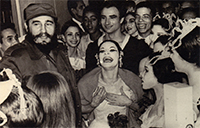
HUM 370-4-20:Mobilizing Revolution: Dancing Histories of Cuba Fulfills Distro 4 (Historical Studies) Citizens and outside observers have called Cuba a dancing island. This course examines the origins and implications of this claim. We analyze the history of Cuba from slave colony to socialist republic as a past filled with movement. Weekly readings cover the choreographies of rebellion, ritual, and revelry during the colonial period, independence struggles, republican era, and following the 1959 Revolution. Throughout we ask the place of dance in daily life and its role in reflecting and shaping historical changes to Cuban politics, society, and culture. | ||||
Bio coming soon | ||||
| HUM 370-4-21 | Red Power: Indigenous Resistance to U.S. Colonialism, 1887-Present | Doug Kiel | MW 3:30 - 4:50 pm | |
HUM 370-4-21 Red Power: Indigenous Resistance to U.S. Colonialism, 1887-Present
HUM 370-4-21: Red Power: Indigenous Resistance in the U.S. and Canada, 1887-Present Fulfills Distro 4 (Historical Studies) In 2016, thousands of Indigenous water protectors and their non-Native allies camped at the Standing Rock Indian Reservation in an effort to block the construction of the Dakota Access Pipeline. That movement is part of a long history of Native activism. In this course, we will examine the individual and collective ways in which Indigenous people have resisted U.S. colonial domination since 1887. Most of the course will focus on the contiguous United States, but we will also turn our attention to Alaska, Hawaii, and the U.S. territories. This course will highlight religious movements, inter-tribal organizations, key intellectual figures, student movements, armed standoffs, non-violent protest, and a variety of visions for Indigenous community self-determination. | ||||
Bio coming soon | ||||
| HUM 370-4-22 | Constructing Identity in the Ancient Mediterranean World | Ann Gunter | TTh 9:30 - 10:50 am | |
HUM 370-4-22 Constructing Identity in the Ancient Mediterranean World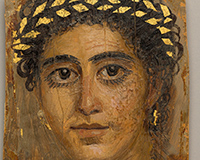
HUM 370-4-22:Constructing Identity in the Ancient Mediterranean World Fulfills Distro 4 (Historical Studies) How did individuals define themselves in the ancient Mediterranean world, and how did they express their affiliation with multiple and diverse ethnic, religious, and other collective social identities? This course explores evidence for self- and group-fashioning in Greece, Rome, and their neighbors in Egypt, Mesopotamia, and Persia. We examine a wide range of textual and material sources, including works of art, archaeological contexts such as burials and religious institutions, biographies, autobiographies, and legal documents. We consider culturally significant modes of self-representation and commemoration, such as portraits and funerary monuments, along with the collecting and transfer of objects that represented accumulated social entanglements, such as heirlooms. What do we know of the construction of gender identities? What dynamic roles did dress, hairstyle, body decoration or ornament, and personal possessions play in establishing and expressing individual and collective identities? This course will draw extensively on museum resources in the Chicago area. It engages in particular with the concurrent Block Museum exhibition titled "Paint the Eyes Softer: Mummy Portraits from Roman Egypt," which emphasizes material expressions of individual and collective identities within the global, multicultural world of the Roman Empire. | ||||
Bio coming soon | ||||
| HUM 370-6-20 | Across the Waters: How Labor, Commodities, and Art Connect the Atlantic with the Indian Ocean | Kaneesha Parsard | MW 2:00 - 3:20 pm | |
HUM 370-6-20 Across the Waters: How Labor, Commodities, and Art Connect the Atlantic with the Indian Ocean
How are ocean geographies connected rather than separated regions? This multidisciplinary course helps students move beyond dominant geo-historical paradigms to gain a new understanding of how Africa, India, and the so-called New World were and are interconnected through the circulation of labor, goods, and aesthetics. Beginning in the early modern period, it addresses processes and events such as trade networks; European imperialism; African enslavement and Asian indenture in the making of Caribbean and Indian Ocean plantation societies; and contemporary artistic and critical discourses on the histories of migration, labor, and cross-racial relations throughout these ocean worlds. The assigned readings include primary sources such as maps, portraits, and travel literature; novels and films; and critical essays. | ||||
Bio coming soon | ||||
| HUM 370-6-21 | Voices of Environmental Justice | Sarah Dimick | TTh 2:00 - 3:20 pm | |
HUM 370-6-21 Voices of Environmental Justice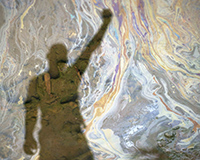
HUM 370-6-21: Voices of Environmental Justice Fulfills Distro 6 (Literature and Fine Arts) This course explores the intersection of the arts and environmental justice movements around the world. We will discuss a broad array of literary texts and other creative projects, considering the relationships between systems of human injustice and environmental issues -- including industrial disasters, ocean acidification, and resource extraction. We will examine environmental justice writing and artwork with a transnational, interconnected approach. For example, we will ask how the Ogoni activist Ken Saro-Wiwa's writing on oil pipelines in the Niger Delta anticipates American Indian statements against the Dakota Access Pipeline. We will draw connections between a poem documenting silicosis in the lungs of West Virginian coal miners and a novel portraying the aftermath of the Union Carbide gas leak in Bhopal. We will compare a nonfiction account of Kenyan women resisting deforestation and an iPhone app reclaiming public access along the Malibu coast. Throughout these works, we will explore questions of voice, genre, and narrative, cataloguing the strategies writers and artists use to make their positions translatable on a global stage. | ||||
Bio coming soon | ||||


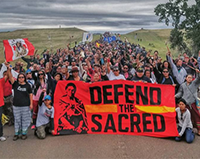
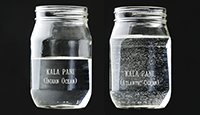 HUM 370-6-20: Across the Waters: How Labor, Commodities, and Art Connect the Atlantic with the Indian Ocean
HUM 370-6-20: Across the Waters: How Labor, Commodities, and Art Connect the Atlantic with the Indian Ocean